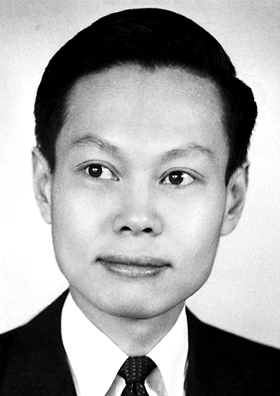
Yang Zhenning
Yang Zhenning, born on September 22, 1922, in Hefei, is a distinguished Chinese-American physicist known for his significant contributions to theoretical physics, particularly in particle physics and statistical mechanics. He gained international recognition alongside Li Zhengdao when they jointly received the Nobel Prize in Physics in 1957 for their work on parity violation. Yang has held esteemed academic positions at various prestigious institutions, including the Institute for Advanced Study and Stony Brook University, and has been influential in promoting scientific research and education in China.
Born on Oct 01, 1922 (103 years old)
Global Media Ratings
Countries Mentioned
No country-level mention data available.
Interactive World Map
Each country's color is based on "Mentions" from the table above.
Recent Mentions
 China:
Yang Zhenning was a world-renowned physicist and Nobel Prize winner who passed away on October 18, 2025, at the age of 103.
9
China:
Yang Zhenning was a world-renowned physicist and Nobel Prize winner who passed away on October 18, 2025, at the age of 103.
9
 Hong Kong:
Yang Zhenning was a Nobel Prize-winning physicist whose funeral ceremony was held in Beijing.
8
Hong Kong:
Yang Zhenning was a Nobel Prize-winning physicist whose funeral ceremony was held in Beijing.
8
 Hong Kong:
Nobel Prize-winning physicist Yang Zhenning passed away in Beijing at the age of 103.
9
Hong Kong:
Nobel Prize-winning physicist Yang Zhenning passed away in Beijing at the age of 103.
9
 Hong Kong:
Yang Zhenning, a renowned physicist, has passed away, prompting various institutions to pay their respects.
9
Hong Kong:
Yang Zhenning, a renowned physicist, has passed away, prompting various institutions to pay their respects.
9
 China:
Yang Zhenning is one of the greatest physicists of the 20th century and has made significant contributions to science.
9
China:
Yang Zhenning is one of the greatest physicists of the 20th century and has made significant contributions to science.
9
 China:
Yang Zhenning was a world-renowned physicist and Nobel Prize winner who passed away on October 18 in Beijing at the age of 103.
9
China:
Yang Zhenning was a world-renowned physicist and Nobel Prize winner who passed away on October 18 in Beijing at the age of 103.
9
 China:
Yang Zhenning was a world-renowned physicist and Nobel Prize winner who passed away on October 18, 2025, at the age of 103.
9
China:
Yang Zhenning was a world-renowned physicist and Nobel Prize winner who passed away on October 18, 2025, at the age of 103.
9
 China:
Yang Zhenning was a renowned physicist and Nobel Prize winner who passed away at the age of 103.
9
China:
Yang Zhenning was a renowned physicist and Nobel Prize winner who passed away at the age of 103.
9
 Hong Kong:
Yang Zhenning is celebrated for his contributions to physics and for helping restore confidence among Chinese people.
9
Hong Kong:
Yang Zhenning is celebrated for his contributions to physics and for helping restore confidence among Chinese people.
9
 Hong Kong:
Yang Zhenning is a renowned physicist who gained attention for marrying 28-year-old Weng Fan at the age of 82.
9
Hong Kong:
Yang Zhenning is a renowned physicist who gained attention for marrying 28-year-old Weng Fan at the age of 82.
9